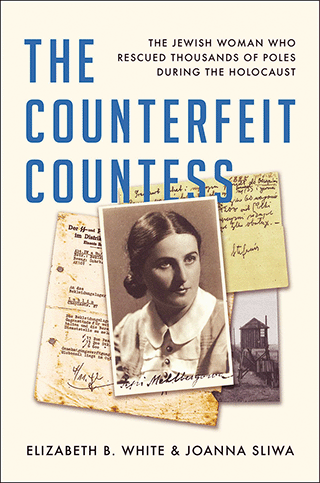Reviewed by NEAL GENDLER
In an unusual contrast to gentiles saving Jews from the Nazis, Jewish Pepi Mehlberg saved Poles.
Those she saved never knew who she really was.
To them and the Nazis, she was a German-fluent Polish countess, a persistent 5-foot, 1-inch powerhouse who stood up to the SS, badgering commandants of the Majdanek concentration and transient camps into letting her bring in lifesaving food and goods in the name of the Polish Main Welfare Council (RGO). Her courageous charade even got 2,106 camp prisoners and 1,022 transients released.
She also stood up to the Polish Red Cross, which didn’t want donated food going to Jewish prisoners. She won, although the Jews would vanish into the Nazi killing machine.
The fake title was bestowed by a family friend, Count Andrzej Skrzyński, with fake IDs to shield Pepi and her husband, Henry Mehlberg. The count got them out of Lwόw, where Jews were being massacred, to Lublin.
As authors Elizabeth White and Joanna Sliwa put it in The Counterfeit Countess: “Pepi Mehlberg had departed Lwόw for Lublin. Countess Janina Suchodolska arrived there in her place.”
Jewish Pepi’s brave accomplishments deserve attention by our people. Captivating as a novel, with a few photos, Countess contains her own words. Clearly written, it’s not a fast read because there’s so much astonishng information.
In Lublin, Pepi/Janina saw a raid and decided to “devote herself to thwarting, however she could, the Nazi plans to destroy Poland and its people.”
The count sponsored her, a pretend Christian, into the helpful underground Polish Home Army, much of it antisemitic. Joining ended fears of helplessness: “Better to die a soldier than a victim.”
Using the fake title required brazen nerve.
“European class consciousness, even among the Nazis, bestowed an automatic deference on nobility that she could exploit — as long as she could carry off the role of someone who took her privilege for granted,” the authors say.
Countess Janina got Nazi officials to allow the RGO to bring thousands of Majdanek prisoners increasing quantities of nutritious soup, bread, other foods, vaccinations, medications, clothing, blankets, bedding straw and packages for more than three years. Twice-weekly deliveries became five, once including Christmas trees.
Poles donated food from their strict rations. Eventually, RGO and the Polish Red Cross — which postwar would claim all the credit — were baking more than six tons of bread a week.
“Such things would be out of the question in any other concentration camp,” says White, a retired historian and research director at the U.S. Holocaust Memorial Museum, and Sliwa, a historian at the Conference on Jewish Material Claims Against Germany. “But when told no, the countess simply made the rounds of higher SS and Nazi authorities until she finally persuaded one that her requests were in German interests.” For example, prisoners put to work could accomplish more if better fed.
“Efforts to deter her had proved fruitless. The petite brunette remained utterly unflappable in the face of shouts and threats from the SS.” Although frightened, she concealed her fear. Several times, she narrowly escaped arrest.
Janina was born Pepi Spinner in 1905, in what now is Zhuravno, Ukraine, to a wealthy Jewish family with many gentile friends. Mathematically gifted, she earned a Ph.D. in philosophy at 22 with a dissertation titled “Mathematical Reasoning and Traditional Logic.” Teaching math in Lwόw renewed her contact with Henry Mehlberg, a Ph.D. in related work.
Prewar, the couple lived well, and she was elected to the Polish Mathematical Society. Henry’s success also was detoured by the war, which he spent in an Skrzyński-arranged job that attracted no attention.
Countess reveals Janina’s methods to increase the quantities of food brought in and to get herself deeper into the camp to observe conditions and talk with prisoners.
She provided an X-ray machine. A tuberculosis device was smuggled in, as were messages and contraband in fake bottoms added to the dozens of milk cans delivering the food.
Quoted negotiations with Nazis are drawn from her own words.
This all came to light after White received an unexpected package from an American history professor in 1969, the year Janina died. Inside was an onionskin copy of a 155-page unpublished manuscript by Janina Mehlberg written in the 1960s and translated from Polish by Henry.
White knew from studies of Majdanek of a Countess Janina Suchodolska delivering aid, but not that the name was an alias — and that she was a Jew.
White “read the manuscript with increasing astonishment — and skepticism.” The story “seemed almost too fantastic … to be true.” But Janina had detailed knowledge “that someone not personally involved … was unlikely to possess.”
White’s first step was to verify that Janina Mehlberg was Countess Suchodolska. Research found a 1975 book review mentioning “Janina Suchodolska Mehlberg,” but White, not speaking Polish, needed to be positive and sent the manuscript to Sliwa, an expert on the Shoah in Poland. They found proof and decided to write a biography, “drawing heavily from Janina’s memoir” plus a great deal of additional research from archives, public records and interviews.
The fascinating result includes Janina’s explanation of success:
“What do you do with your fear and trembling in a confrontation with a swaggering bully? You confine it to the small prison of the heart, letting none seep into the muscles of the eyes, hands, or legs; you quake within and show calm authority without — you pull off a hoax. You must not toady to them, you must not let them sniff blood. Composure and coolness toward them implies the backing of power, and in the face of power they might very well shrink.”
***
Neal Gendler is a Minneapolis writer and editor.
(American Jewish World, March 2024)




















